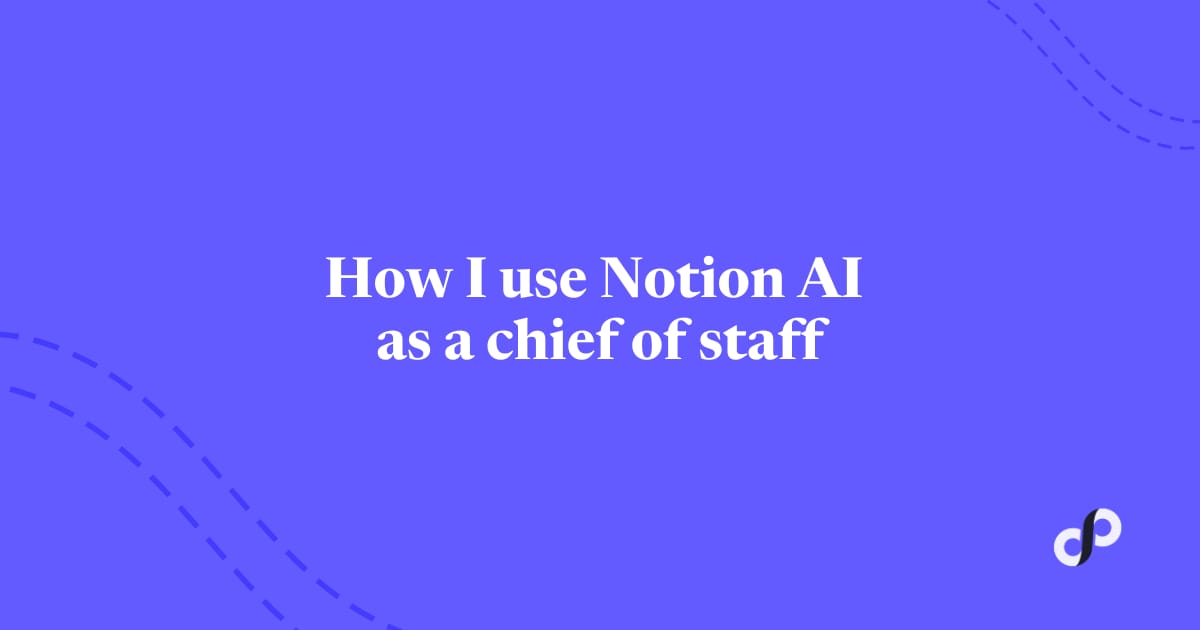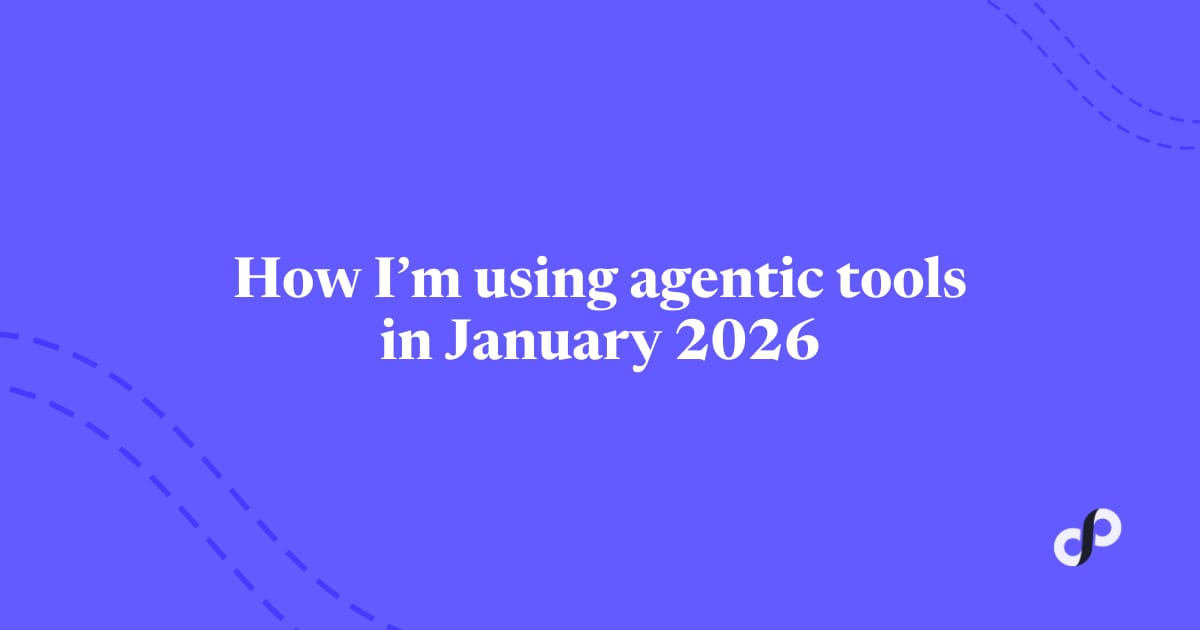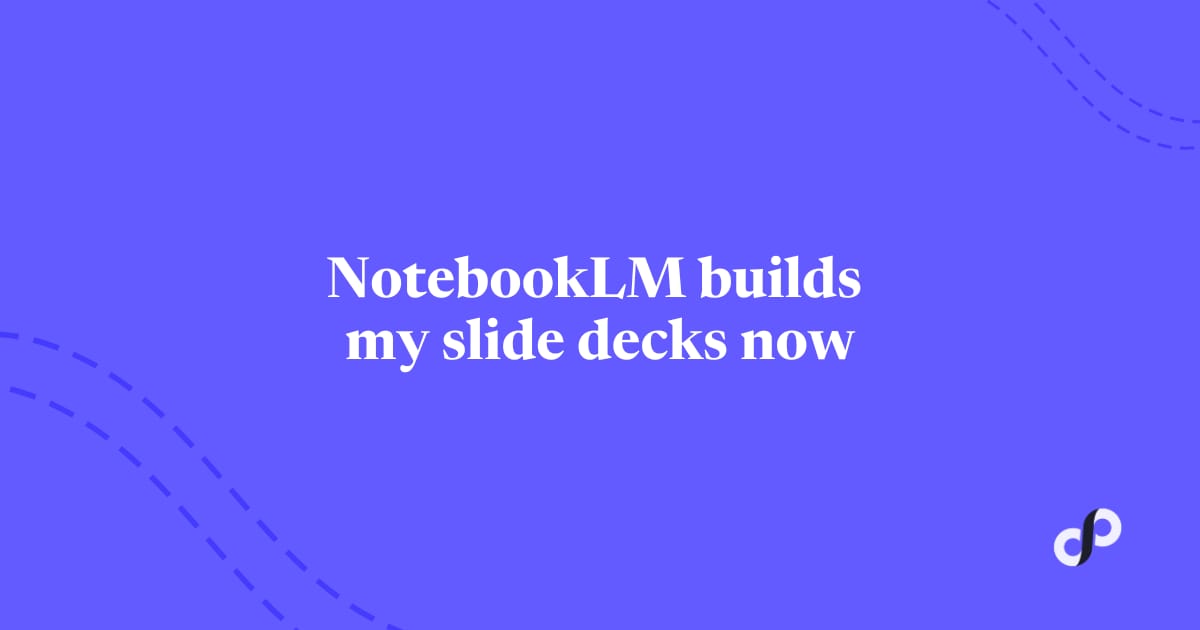In 10 minutes or less, you’ll learn:
- ⏰ 5 specific workflows that transform busywork into strategic thinking time
- 🎯 Real examples of AI handling research synthesis, task management, and content extraction

SPONSORED
🤓 Stop drowning in admin (let Notion AI handle it)

Drowning in scattered notes, endless to-dos, and research that lives in 47 different places?
Join us for a hands-on workshop where we'll leverage Notion AI into your personal chief of staff.
What we'll cover:
🗂️ Building a centralized research repository that actually works
⚡ Auto-generating planning docs and project briefs in seconds
🤖 Automating task management updates so you can focus on real work
💡 Extracting insights and patterns from your data
Perfect for professionals, founders, and portfolio careerists who are tired of admin work eating their best hours. No technical skills needed.
Join us:
To get your brand in front of 7k+ professionals, founders, and consultants, fill this out and let's chat.

🛠️ How I use Notion AI as a chief of staff
I used to waste hours writing docs that gathered dust in Google Drive.
Admin work as a PM was kinda the bane of my existence. At its worst, I felt like a glorified Slack and Google docs monkey. 🐒
Unsynthesized client calls would pile up in Google Docs. Research insights would get buried in an obscure corner of my Dropbox. Tasks would get lost in the shuffle.
At some point, the constant busywork killed some of my excitement for the role.
That’s when I discovered how Notion AI can become my chief of staff to reclaim hours per week from busywork.
And how anyone reading this can do it too.
In this edition, I'll show you exactly how I transformed my workflow by “hiring” Notion AI as my chief of staff - not just another documents tool.
📝 From busywork to fulfilling work
Last month, I had 17 client research calls in 2 weeks. I wanted to map out UX workflows, synthesize into research, and draft planning documents.
The old me would have spent 7-10 hours per week just organizing notes, writing summaries, and drafting initiative plans.
I loved talking to customers, but the busywork that followed often felt slow and painful.
The new me fortunately lives in 2025, where we have a gazillion new AI and automation tools at our fingertips.
Since September, Notion AI was one I’ve adopted a lot - which surprised me.
Frankly, I’m a heavy Notion user, but the AI features were lackluster up until the fall. I could use Notion AI to edit a single page, but only get mediocre results.
But then they launched Notion 3.0 with Agents. Now the AI agents can work across the entire workspace and databases, and the output feels like 2x-3x higher quality.
I’ve found myself go from barely touching Notion AI to using it daily.
🤖 How I built my AI chief of staff
Notion has a Notion AI link in their main menu. If you click it, you’ll see their equivalent of a ChatGPT/Claude home screen.
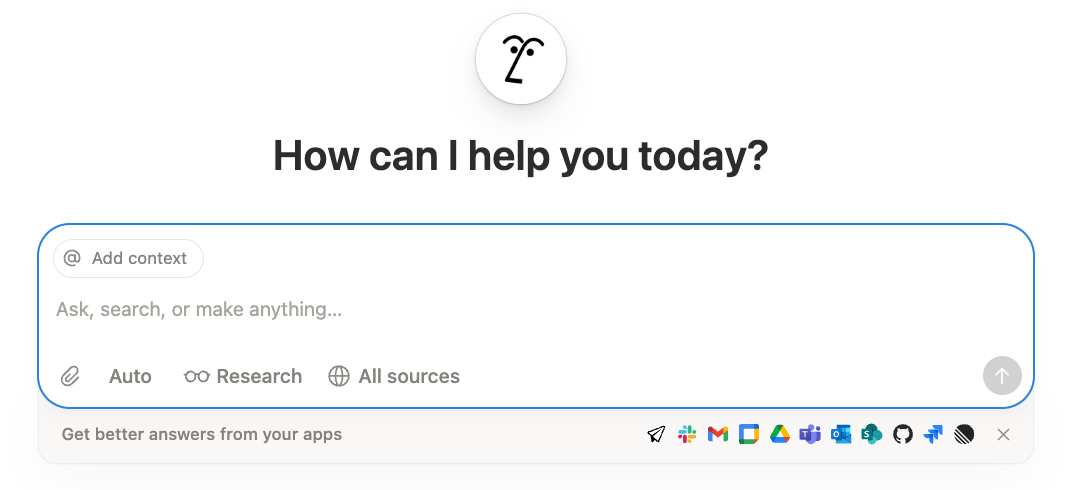
The first steps:
- Setting up the AI personalization
- Linking Notion AI to my email, Slack, and files to ingest context
This is the agent identity I setup for my Portfolio Path workspace (it might look familiar):

Setting up the connectors was also easy, although I’ve yet to leverage them fully. I’ve mainly used Notion AI within the workspace.
Here’s 5 things I’ve used Notion AI for:
🗂️ 1/ Synthesize a centralized research repository
I dump everything from client calls into one Notion page, let’s call it “Research Notes”:
- Meeting transcripts and AI summaries
- Screenshots from client calls
- Competitive research
- Random thoughts and observations
I’ve liked putting everything in one view so I don’t have to click to see more. I can just scroll.
You can use a database for more organization.
One pro of doing this is Notion AI is now good at referencing source pages - so if you have meeting notes in separate pages, it’ll link the citation:

Later, when I want to leverage this “Research Notes” page, I just have to tag it @Research Notes:

Now let’s walk through how I translate these insights into actual initiatives:
⚡ 2/ Generate planning documents in minutes
First, I’ll setup a planning doc template. I like to write section headers and short descriptions to describe what goes into each section to help guide AI (much like guiding a human).
Here’s examples of sections I have in my template:
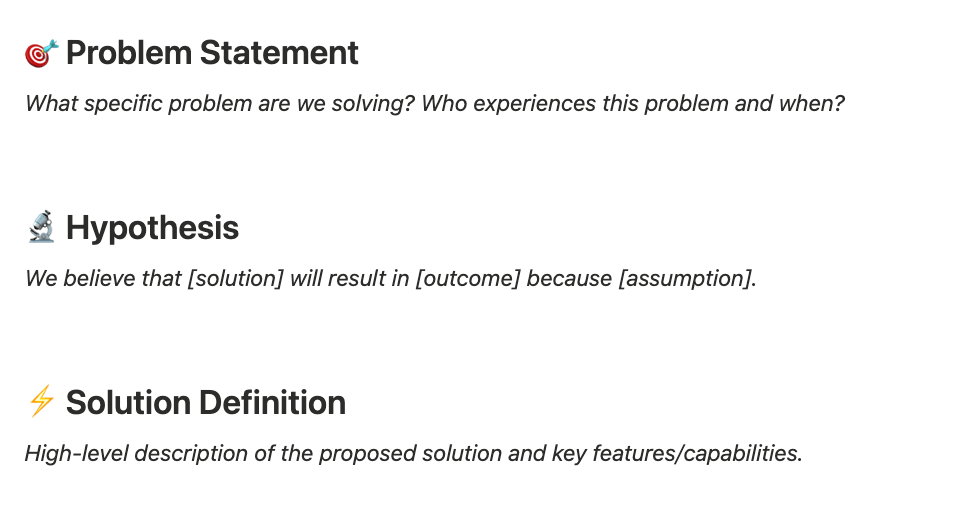
Then instead of staring at the blank template, I write quick bullet points in the appendices:
- Key problem statements
- My hypothesis
- Proposed solutions and components
Then I input this prompt into Notion AI:
Based on the appendices brief and notes and @Research Notes, update each section with clear, concise information. Make explanations accessible to both technical and non-technical team members, avoiding jargon when possible. Include key points and requirements while maintaining brevity. Leave the appendices unchanged.
The key is creating contextual sources and tagging them appropriately in Notion AI - so it doesn’t run out of context window searching for the most appropriate source.
In my work, I’ve setup context using:
- Research Note docs like above
- Discovery board/database with initiatives organized by theme
- Task tracker database
- Team knowledge base docs
For example, here’s an output I generated for planning my Notion AI Workshops with citation links.
It’s not bad as a first pass, but could be even more useful if I ask the AI to include specific quotes from these meeting transcripts:
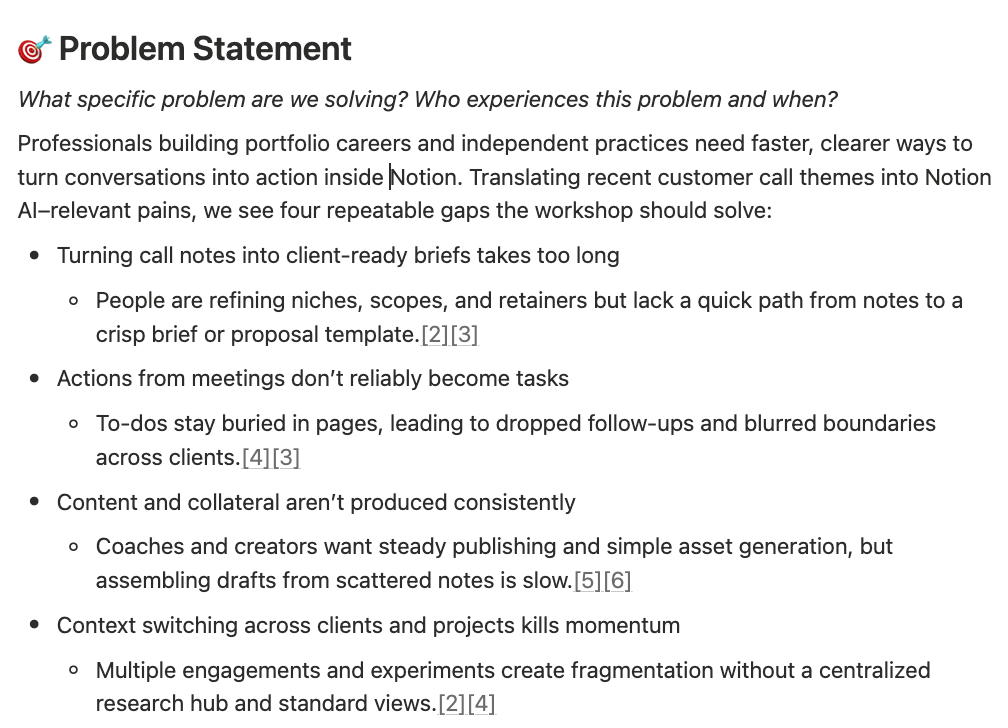
After I generate the first draft, 99% of the time I edit manually and/or refine through continued prompting.
Typically I’ll take one of two paths:
- 0% to 60% of the way there → I continue prompt
- 60%+ of the way there → I’ll edit
Still this means adding somewhere between 5-30 minutes, for what used to take me hours to write manually.
✅ 3/ Automate task management updates
I used to constantly forget to create or check off tasks. I always wished this set of work could be automated.
Finally, it can!
Now I just ask Notion AI to do it:

It scans my completed work based on timestamps, updates task statuses, and keeps my personal task board current.
For example, my team has a running Standup Notes document.
So I have Notion AI ingest this document’s context to check off and add tasks to my personal task board.
This is super helpful especially if I’m feeling wiped out at the end of a busy day and can’t recall what I exactly did (that ever happen to you?).
🔍 4/ Review and extract content
Every newsletter I write now gets auto-reviewed against my writing checklist:
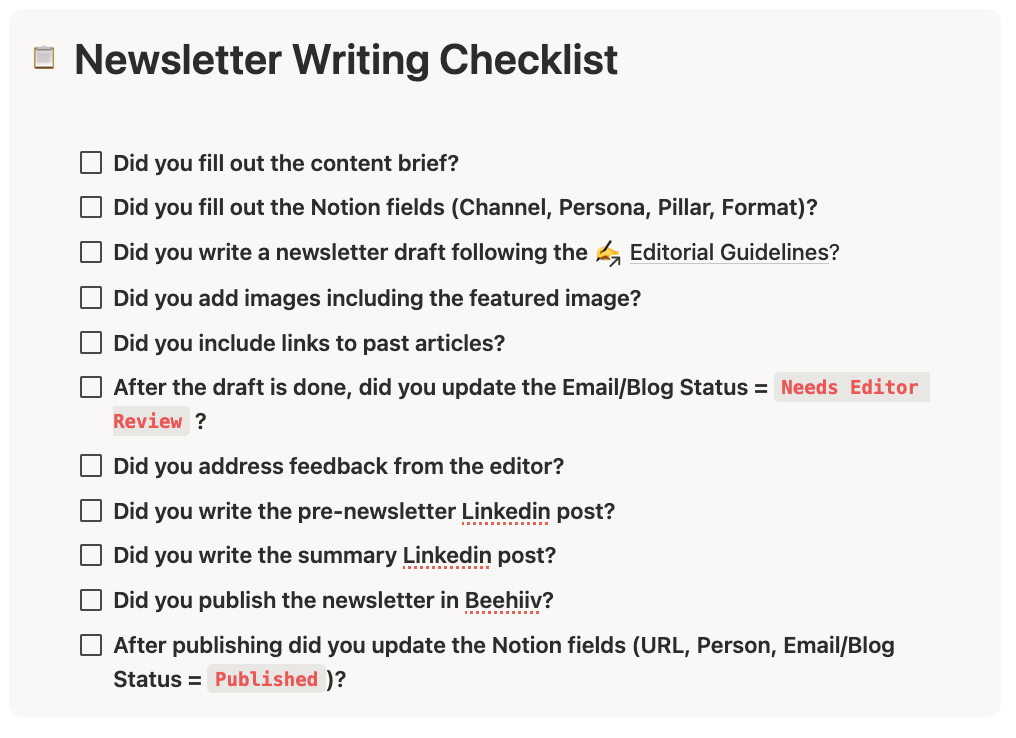
Also instead of manually hunting for great quotes or insights from the newsletter, I ask Notion AI to extract quotes/images/insights from the newsletter and drop it in the appendices for my future writing.
This helps me automatically build my content library.
📊 5/ Automate database creation and updates
I used to dread spending couple hours every week keeping my project boards up-to-date, but now it’s a quick and painless task.
I ask Notion AI to propose new initiatives to create database items for, then I’ll review the ideas before it creates the rows.
What’s really powerful is using it to auto-complete complete/update database fields like:
- Statuses
- Tags
- User Stories
- Calculations

You definitely need sufficient context, but I’ve found it works to get each row to a good spot, then I’ll review and edit minor issues in a few minutes.
📈 The compound effect
These small workflow changes unlocked the work I actually wanted to do.
Instead of spending 7 hours I used to spend on overhead, I can spend them with clients, diving into their biggest pain points. Instead of rushing through the research synthesis to get to "real work," I can go on a walk and think through patterns I otherwise would’ve missed.
I feel less mentally taxed from the busywork, so I can think about the hard problems and trade-offs more clearly.
I’m less likely to be a bottleneck for my team’s workflows. And ultimately, I hope this helps clients get valuable solutions in their hands faster.
What this means for your portfolio career
Most people use AI tools for isolated tasks. Write an email. Draft a Linkedin post.
That's thinking small.
The real opportunity is building systems where AI removes the work that drains you, so you can focus on work that energizes you.
Here are the five use cases we walked through:
- Synthesize a centralized research repository
- Generate planning documents in minutes
- Let AI maintain your task statuses
- Review content systematically and extract reusable insights
- Automate project board creation and updates
Remember whether you're working full-time or building your own business - your competitive advantage isn't how fast you can write status updates.
It's your ability to solve complex problems and build meaningful relationships with clients.
Now go forth and hire your own AI chief of staff!
Thanks for reading. If you’re interested in setting up Notion AI as your chief of staff, I’m hosting a free upcoming workshop on this topic. Join us!

💎 Last Week’s Gems
- Are Millennials Doomed? (Nick Maggiulli)
- Why AI Will Widen the Gap Between Superstars and Everybody Else (WSJ)
- Letter to a Young Person Worrying About AI (Commoncog)

🤩 Community Spotlight
Here’s what our members have been up to in the past 2 weeks:
🍱 Li Si sent her first invoice for mentoring Singapore companies on Australian market entry and celebrated with Japanese dinner
🤝 Betty received a surge of mentorship requests, reminding her how much she loves giving back to the community
💪 Jenny signed another coaching client and got strategic about saying "no" to misaligned project proposals
🚀 Deassy completed 135 offline in-depth interviews in just 2 months (compared to agencies doing 15 online interviews in 1.5 months) and built a new human-AI research workflow
📝 Nishant posted daily on LinkedIn all month while managing an infant, plus lined up a ghostwriting package with an AI founder




